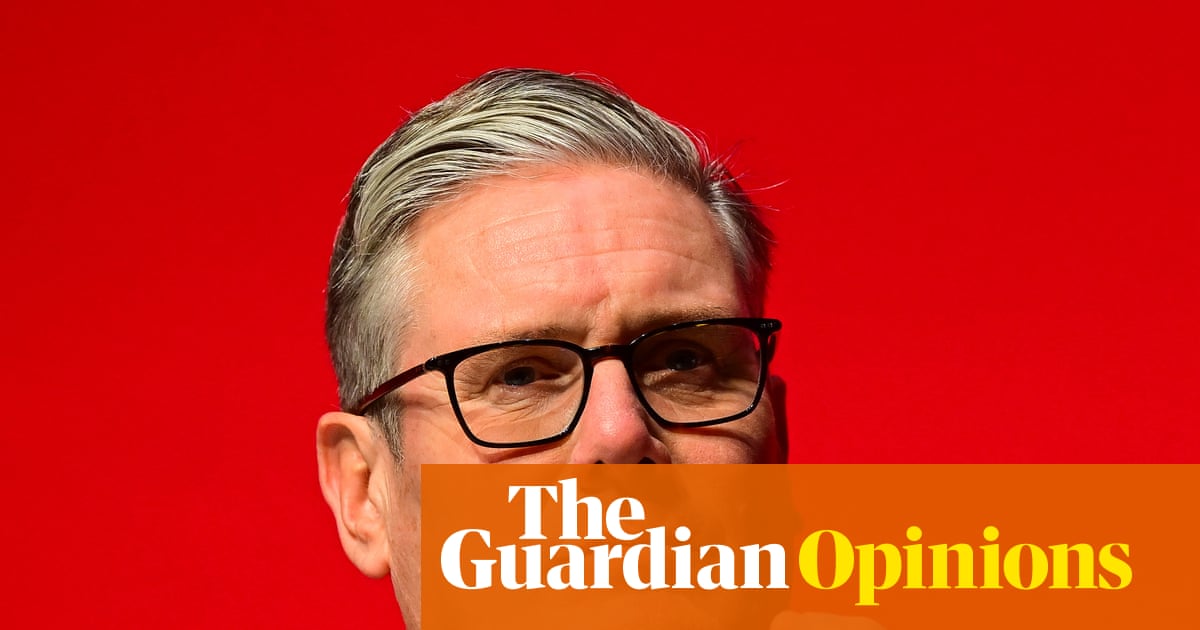Opinion
Labour just doesn’t get it: workers feel poorer than ever. Is it any wonder Reform is rising? | Sharon Graham
Read more on post.

The past two decades in the UK have been dominated by crisis. The 2008 financial crash changed everything, but aside from a bit of dinner party embarrassment, elites carried on as if nothing had happened. For workers, however, it was a different story. And so it almost doesn’t matter what Keir Starmer says in his speech to the Labour party conference on Tuesday. His government still has not grasped the real problems faced by ordinary British people, and that is why Labour is crashing in the polls.
Between 1945 and 2008 in the UK, real increases in average wages were the norm. But after the crash, they stopped rising. If wages had grown to this day as they did prior to 2008, the average worker would be £11,000 a year better off.
As if falling wages weren’t bad enough, British people were then clobbered by austerity. Between 2010 and 2019, public services were butchered; the 4% real terms cut in spending was unprecedented. The axe swung wildly, but perhaps nowhere felt its blade more than local government. The effects of austerity are still being felt to this day: councils have sold off £2.9bn of public assets in the past two years alone, including sports clubs and day centres.
Then came Covid. When politicians took to the airwaves and implored essential workers to come to the aid of the country, they promised that things would be different on the other side – that they would be rewarded with more than banging pots. Nothing could have been further from the truth.
Prices have soared while essential workers’ wages have stagnated. Food prices are up by 38% since 2021 and forecast to rise by another 6%. Household energy bills are 44% higher than they were during winter 2021 with the cap due to increase again next week.
But not everyone has suffered. Since 2021, Tesco has paid out £12.4bn to its shareholders, and Unite’s latest research shows that the top 200 energy companies recorded profits of more than £30bn in 2024. A Unite study of 17,000 companies found that average profit margins have soared by 30% since pre-pandemic levels, as workers and communities pay the price of these profits by spending an ever-greater portion of their income on goods. No wonder people feel the system is rigged against them. Our politicians, meanwhile, argue about black holes and fiscal rules. The government’s focus on arbitrary fiscal targets means it is constantly panicking over the latest economic news, rather than delivering a long-term plan for jobs and British industry. This has led to a string of terrible choices, such as trying to pitch pensioners and disabled people against workers and their communities. Labour has doubled down on Liz Truss’s promise to give the bankers back their mega bonuses. Are any lessons being learned?
Labour’s performance has been compounded by what the Resolution Foundation called the weakest spending review since George Osborne’s austerity years. Between 1966 and 2010, government spending on health and social care grew by an average of 4.2% each year. This year’s increase was only 2.8%. Other departments fared even worse.
It doesn’t have to be this way. If politicians made different choices, they could support our services and rescue our crumbling national infrastructure.
They have done it before. After the second world war, the debt-to-GDP ratio was close to 250% – more than double what it is now. But Clement Attlee’s government chose massive public investment, created the NHS and rebuilt the country. Even in the 1950s, public investment as a share of national income stood at 7.3%. Now it is 2.7%, and well below the average for advanced OECD economies since the turn of the century.
Our government is fiddling while others fully commit. Labour has put just over £50bn into the National Wealth Fund and the British Business Bank. The equivalent institutions in Germany have €1tn (£870bn) in funding: its state investment fund KFW has €580bn and the new ““special fund” has €500bn allocated for investment into the country’s defence and infrastructure.
So long as growth remains anaemic, the only option other than economic deregulation is public investment. The government can restore our public services without hiking the taxes of everyday workers. Unite has looked at proposals from academic experts that together would raise more than £50bn a year. From taxing the wealth of the top 1% at an annual rate of 1%, to equalising capital gains tax with income tax rates and extending national insurance to apply to investment income, the government has options. This is what Starmer should be proposing in his speech to conference. But he will not. All these solutions require a departure from the failed economic norms of the last generation.
after newsletter promotion
If the government doesn’t start acting differently, people will look elsewhere for answers. That includes people within the Labour party, where Andy Burnham is being touted as a challenger to the prime minister. Other Labour voters are moving rapidly towards Reform UK, whose attraction lies not just in flags and culture wars, but in the perceived possibility of change.
Those who marched with Tommy Robinson in London are not all racists. Many are simply trying to make their voices heard against what they believe to be a rigged political system. They march against a cost of living crisis that has no end. Against an economic system that is broken. There is a growing belief that the traditional political parties do not speak for them or care about their concerns.
Is it any wonder that both main political parties, this conference season, are on their knees? People have had enough. If the status quo continues, the real danger may end up being to democracy itself.
-
Sharon Graham is the general secretary of Unite







